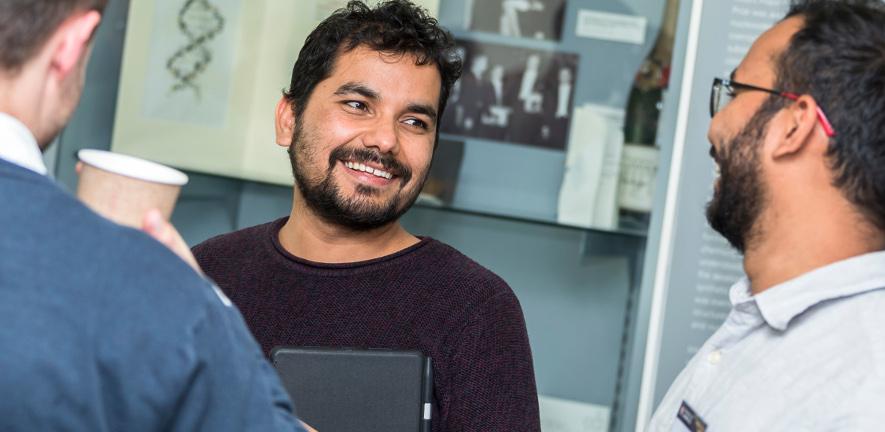
The new CDT will teach students from a range of backgrounds to think differently and creatively about making molecules such as new drugs or ingredients for consumer products.
“We want to train a new generation of researchers in the development of digital molecular technologies and their application to synthetic chemistry challenges, such as drug discovery and development,” said Professor Matthew Gaunt, Director of the new CDT.
“This initiative will allow us to train not only chemists but also chemical engineers, theoreticians and data-scientists of all backgrounds, to create a broad understanding of how we can accelerate and improve the molecule making process.”
Professor Gaunt and Dr Lucy Colwell (Department of Chemistry) have joined forces with Professor Alexei Lapkin (Department of Chemical Engineering & Biotechnology) to create the new four-year PhD training programme in Automated Chemical Synthesis Enabled by Digital Molecular Technologies – SynTech for short, which will start in October 2019.
Inter-disciplinary
Centres for Doctoral Training are postgraduate training programmes which bring together diverse areas of expertise to train physical scientists and engineers with the skills, knowledge and confidence to tackle today’s evolving issues. The SynTech CDT will be the first such programme to deliver training in synthesis and digital molecular technologies and will place UK academia and industry ahead of the global field.
Professor Gaunt said: “Despite tremendous advances in synthesis, it remains a challenge for synthetic chemists to produce on demand new compounds of potential interest for drug and agrochemical discovery and development."
There is a recognised need across the pharmaceutical, biotech, agrochemical, fine chemicals and small-molecule functional materials sectors to dramatically shorten synthesis timeframes and improve both productivity and cost effectiveness, which is becoming increasingly important as the focus on precision medicine and genetic understanding of disease grows.
"We need researchers who can combine new technologies, such as automated synthesis, with data-driven science such as machine learning methods and artificial intelligence,” says Professor Gaunt.
Alexei Lapkin, who is Professor of Sustainable Reaction in Engineering and one of the two co-Directors of the CDT said: “Building a cohort where synthetic chemists, engineers, computational scientists and data-scientists interact through training and research on a daily basis is a direct path to a paradigm shift in scientific thinking. The output from this program would simply not be possible within the framework of a traditional PhD."
He continued: "We believe the SynTech CDT will create a unique and rewarding training and research environment, where our postgraduate students will work at the interface of established disciplines to automate chemical synthesis, accelerate the design and production of small molecules for any application, and in doing so address new translational challenges that will inevitably emerge.”
Growth of the Machine Learning & Artificial Intelligence industry in the UK is extremely strong, with an anticipated potential contribution of £200bn by 2030, according to Co-director Dr Lucy Colwell, who specialises in computational research here. The goal of the CDT is for students to develop a sophisticated appreciation of the challenges and impacts that these digital molecular technologies can have on synthetic chemistry.
Dr Colwell said: "It is really important that we are able to translate AI models into real-world commercial applications, many of which apply to the pharma and broader chemical sectors. The SynTech CDT will train chemists alongside engineers & computational scientists to work collaboratively on translational projects that require pan-disciplinary skill sets."
New courses attract high calibre students
To meet this vision, the CDT will offer a broad range of new bridging courses, designed to build students’ skills and enable them to think across core disciplines, layered on top of a foundation of highly regarded graduate courses, developed and delivered by the Department of Chemistry.
“We are looking for students of the top calibre, and envisage a high demand for places,” said Department of Chemistry Head of Graduate Education, Dr Deborah Longbottom. She expects the SynTech CDT to attract synthetic chemists, chemical engineers, mathematicians and information engineers to create a diversely skilled graduate cohort, each bringing a willingness and enthusiasm to be exposed to research and teaching outside their core skill set.
“Our training will enable each student to become an expert in a chosen field related to the CDT’s scientific aims. We will also equip them with a broad set of complementary skills, including the University cross-CDT training in sustainable chemistry and ethics. Our CDT PIs are world-leaders in all of the disciplines related to the SynTech CDT, who attract a high quality of graduate students to their research groups,” she said.
Excellent career prospects
Students who complete the SynTech programme will be in high demand, says Professor Gaunt. “Researchers with the skill sets we will develop are currently extremely rare, yet the increasing impact of data-driven science means that the world-wide demand for chemists with capabilities in coding, machine learning and informatics is growing. Career prospects for our students will be excellent because their knowledge will cover skills encompassing chemistry, engineering and data-science.”
As part of the SynTech CDT, all students will also have access to industry experts via CDT journal clubs, mentoring and networking events, and they will benefit from exposure to a wide range of potential career directions and opportunities at both a University and Departmental level.
Application deadline
The PhD studentships are advertised on the department website. The application deadline for entry in October 2019 is 9 am on Monday 4 March 2019. Apply now.
Funding
The University of Cambridge has created significant infrastructure to support the SynTech CDT’s research. Brand new laboratory space and equipment in the Department of Chemistry will host and support many of the CDT’s students in delivering both the training and research objectives of the CDT. The SynTech CDT will fund students for four years. Funding is provided by the Engineering and Physical Sciences Research Council (EPSRC), industry partners from across the sectors associated with the Centre and the University of Cambridge.

